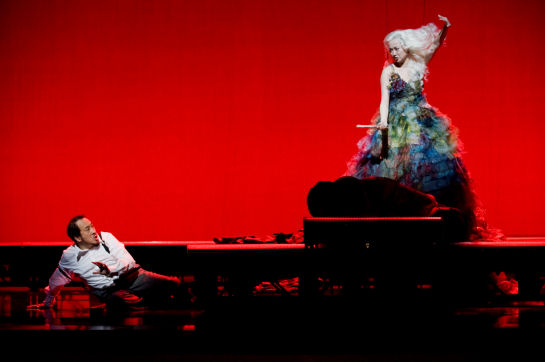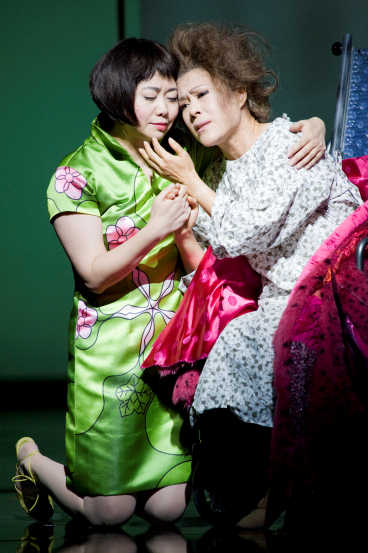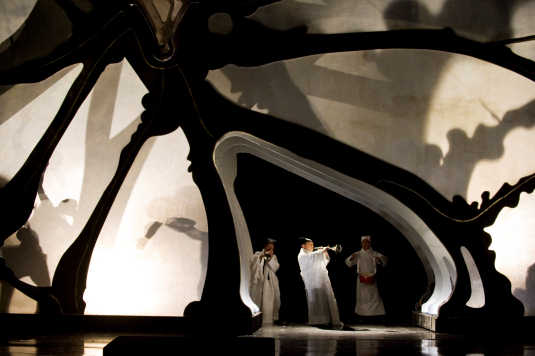Other Links
Editorial Board
- Editor - Bill Kenny
- London Editor-Melanie Eskenazi
- Founder - Len Mullenger
Google Site Search
SEEN
AND HEARD INTERNATIONAL OPERA REVIEW
Stewart Wallace, The
Bonesetter's Daughter:
Libretto by Amy Tan after her novel. Soloists, orchestra of San
Francisco Opera, Steven Sloane, conductor, War Memorial Opera House,
San Francisco. 13.9.2008 (HS)
Composer Stewart Wallace and novelist Amy Tan worked for four years
to create an opera based on Tan's novel, The Bonesetter's
Daughter. Saturday night it grabbed the stage with a highly
emotional story, colorful staging that included Chinese acrobats,
dancers and musicians, a cast that supplemented standard opera
singers with one from Chinese opera and another from the Chinese pop
world, and some ravishing music by Stewart Wallace that drew from
all those sources.
Wallace, whose music was last heard here when San Francisco Opera
premiered his other San Francisco-based opera, Harvey Milk,
is not afraid to use the conventions of opera, however. There is a
mad scene, a fiery curse scene, and a Chinese wedding ceremony.
Characters respond to emotional moments with arias and duets, but
the music carefully transitions out to avoid stopping for applause.
The bad guy, Chang the coffin maker, introduces himself with a
malevolent bass aria like a 21st-century cross between Dulcamara and
Scarpia.
There's something else I like about Wallace's music. The melodies
set the words clearly. You can understand every phrase because they
move slowly enough and the orchestral elements never block them. And
his melodies go somewhere. Not for him what seems to be the fashion
of modern opera to write melodic fragments that evaporate instead of
landing somewhere.

Hao Jiang Tian (Chang the Coffinmaker) and Qian Yi (Precious Auntie)
Perhaps the most amazing thing is that they made it all work with
very few missteps. Future productions, and there should definitely
be some, might want to cut back on some of the artsy film
projections and aerial acrobatics. Or maybe not. They certainly
added to the sense of otherworldliness, of being in between two
cultures. This theme pervades this book, and much of Tan's writing,
including her most famous work, The Joy Luck Club. But for the
much-anticipated world premiere, it was simply dazzling.
Musically, Wallace created a score that pulses with rhythmic life
even when it seems to be in stasis, using percussion some of the
time but often it's the thrust of the orchestral elements. The
company's orchestra made it sound luminous. He and Tan made several
trips to China for research, and while he asserts that he used no
actual Chinese music (no appropriation of famous Chinese melodies à
la Puccini in Turandot), it feels like it, a tribute for his
ear and composing ability. He seems to have consciously avoided
using the cliché of music that relies a pentatonic scale, and it all
feels fresh and vibrant.

Zheng Cao (Ruth Young Kamen) and Ning Liang (LuLing Liu Young)
The opera opens with two Chinese musicians positioned in the Grand
Tier playing suona, trumpet-like reed instruments. They later
reappear on stage, leading moments that emphasize Chinese parts of
the story. After some aerial acrobatics, the three main characters
appear in a fog, telling an elliptical version of the story. The
phrase, "These are the things I know" recurs, and the whole scene
reprises just before the final scene. This is a nice stroke. Having
seen the whole story play out, we hear the words and music in a
whole new context.
We don't know in this prologue, for example, that the three
characters represent three generations of women: LuLing, who left
China for San Francisco, her mother, known only as "Precious
Auntie," who killed herself in the old country, and her
American-born daughter Ruth, who has married an American Jewish man
with two children. The extra resonance from the return of the
opening words and music is one of the opera's highlights.
This music here and throughout echoes the clash and melding of
cultures that is inherent in the story. Mezzo sopranos Zheng Cao,
who plays Ruth, and Ning Liang, as the present-day LuLing, have sung
key roles at major opera houses, including the Met, La Scala and San
Francisco. Precious Auntie, being a character entirely of China, is
sung by Qian Yi, a star of the Chinese opera. Wallace brilliantly
incorporates the swoops and gestures of Chinese opera into the
English language. Elsewhere the melodies move as in western opera.

Zuo Jicheng (Suona Player), Wu Tong (Priest, Suona Player)
Li Zhonghua (Percussionist)
The story begins in a Chinese restaurant. The waiters are acrobats
suspended in midair. It is LuLing's birthday and Ruth has arranged a
banquet. We learn that Ruth is a ghost writer who is working on a
book by one of the attorneys in the O.J. Simpson murder trial.
Agitated by an unwelcome gift, the mother starts to babble about
having been at the murder scene, and collapses with a stroke.
Unconsolable and alone, Ruth sings of how her mother disciplined her
as a child and contemplates suicide. A ghost who has been floating
through the scene puts a Chinese cloak on Ruth and ushers her to the
China of her mother's young adulthood.
In scene 2 we meet Chang the coffin maker (bass Hao Jing Tian, who
was the general in the Met's The First Emperor last season),
who upsells his coffins by telling everyone that cheap ones let the
ghosts out to haunt the survivors. At the ink factory where he sells
his surplus wood, he leers at LuLing, a young slave girl. In a
lovely stroke, she is played by Cao, who was Ruth in scene 1. Qian,
who was the ghost, is working alongside her, and Chang boasts that
he has had his way with her. She has also raised LuLing, whom she is
said to have found as a baby. Chang decides he want to take LuLing
as his fourth concubine. The wedding ceremony brings in Chinese
music and pageantry, and a vengeance aria from Precious Auntie, who
immolates herself, burns down the house and promises to haunt Chang.
Act II opens with LuLing homeless in Hong Kong harbour, writing
letters for the wives of men who have gone ahead to America. Chang
appears, having stalked LuLing, intent on raping her. The emotional
moment triggers a trio of the older LuLing in her hospital room,
Precious Auntie in her limbo and the young LuLing. Precious Auntie
breaks through her ghosthood to confront Chang and extra his
confessions: he murdered her father, raped her, and was about to
rape his own daughter. They reprise the prologue, which leads to the
final scene; in a moment of lucidity, LuLing and Ruth find
reconciliation in a lovely duet, and the music ends with
extraordinary delicacy as LuLing dies and reunites with the ghost of
Precious Auntie.
The staging relies on abstract settings, a moving back wall that can
reveal projected moving images and extends a walkway high above the
stage where Precious Auntie can deliver her curse. Director Chen
Shi-Zheng, best known for bis staging of the Chinese opera Peony
Pavilion, has created two hours 40 minutes of beautifully
controlled movement and, despite the stories within stories that
move through time and space, keeps it all lucid.
Qian, the Chinese opera star, and Wu Tong, a conservatory-trained
Chinese pop singer who plays the suona and portrays a Taoist priest,
singing in a clear, high voice, wear head microphones and are
amplified to balance the opera singers in rest of the cast. The
sound is unobtrusively done. In smaller roles, baritone James
Maddalena does well as the clueless American husband, Artie, and a
team of Chinese percussionists provides plenty of musical color.
But the stars are Cao,
as Ruth, and Liang, as her mother. Cao's music skews toward the high
end of the mezzo range, Liang's to the lower end, and they sing with
extraordinary richness and plangency. They also look the parts. The
other vocal star is Tian, as Chang, his sound alternately rock solid
and dangerously sinuous.
Conductor Steven Sloane, who conducted the world premiere of Grendel
at Los Angeles Opera last year and Le Nozze di Figaro at Covent
Garden, elicited some gorgeous playing from the orchestra and kept
everything in balance. The chorus, in its few crowd scenes, sang
well in something resembling medieval polyphony.
It's a strange and wondrous mix of sounds and sights, but the
emotional core packs the biggest punch, especially in the final half
hour.
Harvey Steiman
Pictures © Terrence McCarthy
Back
to Top
Cumulative Index Page
